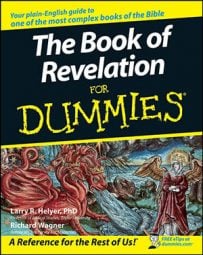The real meaning of the Bible's Book of Revelation is a popular, ongoing debate. You'll find four major interpretive approaches to the Book of Revelation that can help you read, understand, and figure out the apocalyptic letter of John. Key to understanding commentaries on Revelations is knowing the position of the commentator.
Here are brief definitions of the four major interpretive approaches:
Preterist: Revelation speaks of things that are already history. The book isn't prophecy about the end of time; it's directed at Christians trying to live their faith in the Roman Empire. This is the prevailing view among modern scholars who aren't aligned with orthodox Christianity. Strength: The observation that the book was intended for a first-century audience. Weakness: Fails to take seriously the idea that the Holy Spirit can reveal what's going to happen, as the book purports to do.
Historicist: Revelation gives a bird's eye view of the entire sweep of Christian church history, from the post-Pentecost church (Acts 2) until Jesus returns. This view has few adherents today. Strength: The conviction that God controls the course of history. Weakness: Revelation then has little relevance for its original audience; also, historicists have wildly divergent views concerning the particulars.
Idealist: There's no correlation between the visions and any historical reality; they're simply symbols of the ongoing struggle between good and evil. Strength: The recognition that the book clearly communicates enduring ideals. Weakness: Divorces ideas from history, thereby calling into question Jesus's historical death, resurrection, and ascension.
Futurist: By the sixth seal (6:12–17), the book describes events leading up to Jesus's return. Glances at earlier stages of redemptive history (as in Rev. 12) illuminate End Time events. The focus is on a historical struggle that unfolds at the end of the age and climaxes with Jesus's Second Coming. Strength: Incorporates the insights of the other views without sacrificing the essential point of their position: namely, that the book prophesies a literal return of Jesus and a new creation. Weakness: The weakness of the futuristic view is that it interprets 1:9–3:22 just like preterists and historicists, that is, as referring to the first century. Then it declares that at 4:1, or at least by 6:12, the sixth seal, everything else is about the final period of earth history before Christ returns. Critics find this arbitrary and therefore unconvincing.

